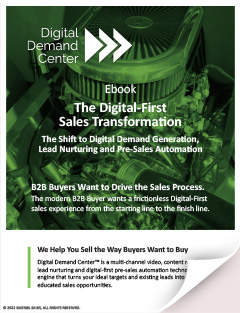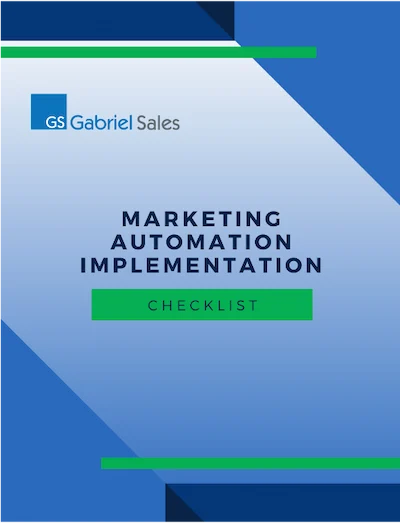
How Targeted Marketing and Ideal Customer Profiles Improve Campaigns and Lead Nurturing
In this article, we will explain the benefits of integrating your targeted marketing practices with your ideal customer profiles. Combining the two tools enables businesses to optimize their marketing efforts, improve the relevance and personalization of content, increase conversion rates, build stronger customer relationships, and drive better customer acquisition and retention outcomes. It maximizes the effectiveness of marketing strategies and ensures that resources are allocated to the most valuable customer segments.
So, let’s start by defining terms.
What is B2B targeted marketing?
B2B targeted marketing, also known as business-to-business targeted marketing, refers to the practice of tailoring marketing efforts and strategies specifically to businesses, rather than individual consumers. It involves promoting and selling products or services from one business to another.
In B2B targeted marketing, the focus is on reaching key decision-makers within the target businesses, such as executives, managers, or purchasing agents, who have the authority to make purchasing decisions on behalf of their organizations. The goal is to create awareness, generate interest, and ultimately convince these businesses to engage in a commercial relationship.
What is an ideal customer profile?
An ideal customer profile (ICP) is a fictional representation of the perfect customer for a business. It is a detailed description of the type of customer who is most likely to derive the highest value from a company’s products or services. The ICP helps businesses identify and target their most desirable customer segments more effectively.
By understanding your ideal customer profile, both Digital Demand Center and our customers can better tailor marketing strategies to reach the most qualified prospects. The creation of an ideal customer profile involves analyzing and understanding the characteristics, behaviors, and needs of existing successful customers. Here are some key components typically considered when developing an ICP:
- Title and Level of Contact – You want to ensure your marketing efforts reach buyers that can make or influence a purchase decision.
- Functional Area – Understanding the specific roles or departments involved in purchasing decisions, such as procurement, marketing, IT, finance, operations, human resources, and executive leadership, is crucial for effective targeting. Tailoring messaging to decision-makers’ needs and priorities within these functional areas enhances campaign effectiveness.
- Vertical Market – This is especially important if having existing referrals or expertise is important to close the sales.
- Demographics – This includes information such as industry, company size, location, annual revenue, and employee count. These demographics help identify businesses that align with the company’s target market.
- How to Run an Account Based Marketing Campaign – Identifying the specific challenges, problems, or needs that the ideal customer faces helps position the company’s offerings as solutions. This understanding enables businesses to create targeted marketing campaigns that address these pain points effectively.
We also recommend that you look at past customers that you struggle to retain. This means analyzing your past failures. Understand what type of customers drive the least amount of revenue for the most effort.
Three Reasons Why an Ideal Customer Profile Is Important for B2B Targeted Marketing and Lead Nurturing?
An ideal customer profile is a key factor in any successful B2B marketing strategy. Defining an ICP helps you understand how to:
- Maximize your targeted marketing budget.
- Decide what content to create for your campaigns.
- Ensure better open rates for email campaigns.
How does an ideal customer profile help you to understand what marketing channels to use for your business?
An ideal customer profile can help you understand which marketing channels to use by giving you an idea of where your audience resides. Knowing the age of your target customer will can help you choose the most effective platforms and methods for reaching them so that you’re not wasting time, energy or resources on marketing that won’t be successful.
By understanding where and how your target audience likes to receive messages, you can craft campaigns that deliver maximum reach and engagement. For example, if you’re marketing to baby boomers, it might make sense to focus more on Facebook and display ads than other social media to build your initial awareness. Similarly, when your ICP contains the characteristics of your target customers, such as industry, company size, and location, you can more easily identify the platforms or channels commonly used by your target audience. For example, if your ideal customers are primarily active on LinkedIn and attend industry-specific events, this suggests that utilizing these channels could be beneficial for reaching and engaging with them.
If your target audience heavily relies on online research and engages with content through social media, investing in digital marketing channels like social media advertising, content marketing, or search engine optimization (SEO) could be effective. On the other hand, if your customers prefer face-to-face interactions, attending trade shows, conferences, or industry events, may be more suitable. If you’re targeting millennials or Gen Z, digital platforms like Instagram and YouTube would likely be more effective.
Finally, an ICP can also help you identify opportunities for expanding into new markets or demographics. For example, if you see that a certain segment of your target audience is disproportionately engaging with influencers on TikTok, it could be a sign that you should consider investing in influencer partnerships to reach those buyers. By understanding where and how your target audience prefers to receive messages, you can tailor content and campaigns for maximum efficiency.
But it’s important to remember that, according to Salesforce and Hubspot, email remains the preferred channel for initial awareness and education for the B2B buyer.
How does an Ideal Customer Profile help you decide what content format to create for your campaigns?
Your ideal customer profile can also help you decide what content format will be most effective for engaging with your target audience. Depending on the interests, goals and needs of your ICP, certain formats may be more suitable. For example, if your ICP consists of younger generations, then creating visual content such as infographics or videos might be effective in capturing their attention.
On the other hand, if your ICP consists mainly of professionals, then creating content such as white papers and webcasts may be more appropriate. This is especially true if you have a complex sales process that requires building trust with your buyers over time.
Understanding the interests and needs of your ICP will help you identify which formats would be most suitable for delivering quality content that resonates with them and encourages them to become curious about your solution.
No matter what format you choose, it is important to always be mindful of the message you are trying to communicate. Focus on creating content that is accurate and clear, as this will help your audience easily understand the information being provided. Additionally, ensure that your content is relevant to the interests of your ICP.
How does an Ideal Customer Profile Help you build better email subject lines?
Knowing your ideal customer profile helps you create better email subject lines that will resonate with your target audience.
Email subject lines will be tailored to the potential buyers’ needs and also help to make it clear why they should open the message. By focusing on areas of need and potential pain you will get more opens.
For example, C-Level Executives care about strategy and the organization’s performance: They prefer subject lines that are often more top line focused like:
- “A Proven Strategy to Increase Your Profits”
- “How Does XXXXXX Increased Productivity?”
By focusing on the top line and strategic value that you are providing, C-level executives will be more likely to open your message.
And as a second example when selling to managers you may want to stay focused on their team and efficiency. When writing email subject lines for managers, they should also be clear and informative but focused on the team, cost savings and shorter-term goals such as:
- “Learn How to Increase Your Team’s Efficiency”
- “Increase Productivity with This Simple Solution”
- “How To Increase Production This Quarter With…”
- “Discover How You Can Save Resources”
Summary
By developing an ideal customer profile, businesses can focus their marketing efforts and resources on attracting and serving customers who are most likely to become long-term, profitable relationships. The ICP guides various aspects of marketing, including messaging, content creation, lead generation, and customer acquisition strategies.
To learn more about how Digital Demand Center can help you maximize your sales and marketing budget we invite you to check out our eBook on the Digital First Transformation.




